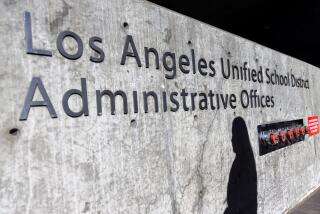Net Access Brings Concerns to Schools
- Share via
The assignment was to type an essay, using a word-processing program loaded into computers at Camarillo High School.
But three boys in the back row of Valarie Zeko’s college-prep English class had another idea: They were cruising the Internet.
One of the ninth-graders found a site called the Portland Anarchists Club and quickly scrolled to a page titled Making Plastic Explosives From Bleach.
The boy laughed about it with his buddies and then zipped to another site, this time about skateboards. Zeko, meanwhile, was not aware of the boys’ activities because she was helping 27 other students use their computers.
But Zeko is among a growing number of teachers, parents and administrators who are concerned about students using the Internet to reach sites that depict pornography, advocate violence or contain other inappropriate material.
Zeko said it is not possible for her to monitor every machine when she is busy.
“They go right to Playboy magazine and How to Make a Bong,” she said. “They know exactly what to look for.”
Student access to the Internet currently is rare in Ventura County schools. Fourteen districts have links, but most are limited to single ports in a library or media center.
The remaining six school districts have no connections at all. But local interest in the worldwide network as an educational resource is mushrooming.
Many schools plan to make banks of computers with Internet access available to students. But less clear is how educators will monitor the explosion of ideas that the cyberhighway places at students’ fingertips.
Software publishers have responded with a variety of programs designed to help educators identify online smut and other objectionable sites and block access to them.
But the so-called firewalls, including Surfwatch and Cybersitter, must be continually updated because new cybersmut hits the Internet every day, said Glenn Lipman, an assistant principal at Camarillo High.
“There’s a million inappropriate sites out there,” Lipman said. “So we just try to make sure the kids don’t go into those areas.”
Districts throughout Ventura County are beginning to consider disciplinary codes to deal with students who wander into illicit material. At Camarillo High, first-time offenders get a call to their parents. If the conduct continues, students can be suspended, Lipman said, although that step has not been taken so far.
Notwithstanding schools’ best efforts, some sophisticated computer users will always find a way around firewalls, said Richard Simpson, assistant superintendent of instructional services for the Conejo Valley Unified School District.
But it is up to school officials to ensure that for most students, inappropriate material remains out of reach, Simpson said.
“It’s just like in our school libraries,” he said. “We don’t put pornographic material there, and we shouldn’t let them get it off of computers.”
More to Read
Sign up for Essential California
The most important California stories and recommendations in your inbox every morning.
You may occasionally receive promotional content from the Los Angeles Times.














